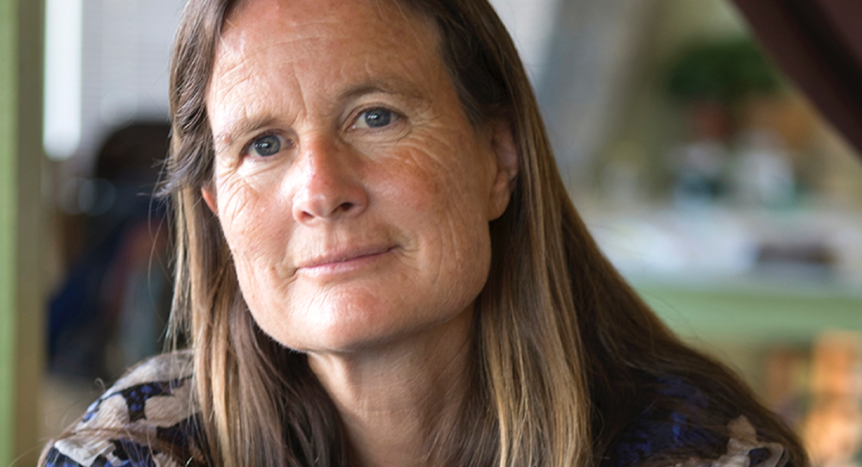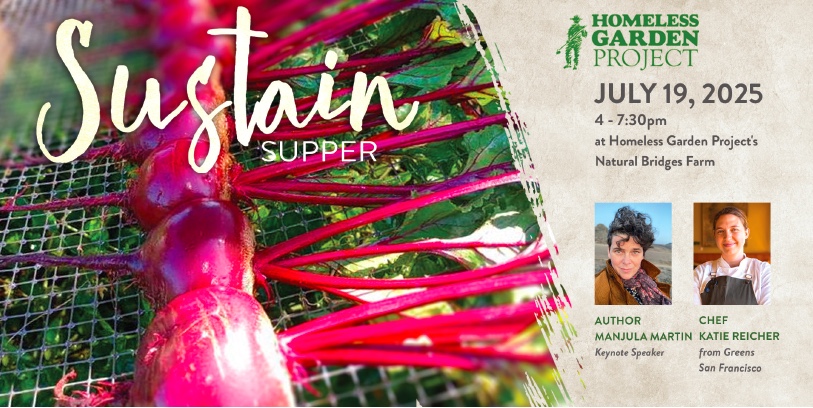Andrew Zimmern interviewed Darrie Ganzhorn, our Executive Director about the organization’s different facets, how the farm is a great equalizer and ways to get involved. Read the interview on AndrewZimmern.com
AndrewZimmern.com: What is the mission of Homeless Garden Project?
Darrie Ganzhorn: Our mission is “In the soil of our urban farm and garden, people find the tools they need to build a home in the world.” And our vision: “We envision a thriving and inclusive community, workforce and local food system.”
AZ: What is your background and how did you first get involved with this organization?
DG: I studied Biology at UC Berkeley and wanted to do research. Having children changed all that for me — I felt so fortunate for my family and wanted to give back to my community. I wanted to work with basic needs, such as food and shelter.
I arrived at the HGP during its first year as a volunteer and asked if I could help produce a newsletter that told the story of HGP through the voices of the trainees — people who were homeless and participating in the programs. I was able to have very honest conversations with the trainees about their homelessness and how HGP was changing their life. One trainee, Bill, wrote a fantastic article, “A Day in the Life of the Homeless Garden Project.” He was a Vietnam veteran and a natural writer. Getting to know him as we worked on this project changed my life; knowing and working with HGP’s trainees continues to change my life.
AZ: How has it evolved over the past 20 years?
DG: Over the years, HGP has gotten more clear about helping people to achieve big goals: getting a job and getting out of homelessness.
The Project is good at building on previous year successes, including how we engage the community and how we build our enterprises. The Holiday Store, which is open between Thanksgiving week and December 24, sells more products each year, has compelling displays, an ever-growing following, and a growing volunteer staff. Last year, 50 volunteers staffed our store with positions including Ambassador, Cashier, and Shift Manager.
Food has taken on a more important role: we serve a daily lunch featuring our organic veggies, and we have a fundraising farm dinner series, known as SUSTAIN. And, our program that supplies produce to low income people has grown tremendously. This year we provided produce to seven nonprofit agencies, from the AIDS Project to a program working with foster youth.
AZ: Tell us about a few of your programs and who they benefit.
DG: In practice, our programs are very interrelated. Only on paper is it possible to view them as separate. Our job training and transitional employment program serves people who are homeless. Our Cultivating Community program, a community education and volunteer program, serves the broader community. And this community is very broad! In 2012, we served 1,500 people in Cultivating Community, including seniors, students from preschool through graduate programs, people with developmental disabilities, church groups, business volunteer groups, families and more.
The farm is the great equalizer. Everyone is on common ground and working to achieve the day’s goal, a tangible outcome of working together and working with the earth. Trainees work to show volunteers how to harvest produce that will be distributed to low-income people; it is a great source of pride for our trainees to grow healthy, organic produce for low-income people. Volunteers cook lunch in the kitchen with a trainee, then everyone eats lunch together. Often visitors will comment that they couldn’t tell who was homeless.
A conversation between a trainee and volunteer can lead to a volunteer’s increased understanding of homelessness, as experienced by one person, of the humanity of the people involved and of the potential our trainees have to offer the community. It can also lead to trainees feeling they belong and have a community of support that is encouraging success.
AZ: What kind of produce is grown throughout the year? Do you teach people how to cook with the fruits and vegetables?
DG: We farm on the Westside of Santa Cruz, very close to the ocean. Our micro-climate is highly influenced by summer fog. In late summer/early fall, the farm really produces. We grow a lot of greens, strawberries, raspberries, herbs, brassicas, beautiful carrots and beets (my favorite this year was the bull’s blood variety), padron peppers, squashes—both winter and summer. We grow a wide variety of flowers for use in bouquets and for drying.
Trainees rotate through “posts,” an opportunity to focus in a specific area and associated skills. One of those posts is kitchen. Kitchen post trainees work with volunteers to feed up to 50 people a day, drawing from produce grown at the farm. The food is simple, nourishing and delicious.
AZ: How can others get involved?
- Learn about our programs from our website; sign up for our email blasts that give updates about our work and events.
- Become a Facebook friend.
- Donate, any amount helps. We are truly fueled by ordinary people who believe in what we’re doing and contribute what they can.
- Shop at our online store! Great gifts made in our training program, from our organic farm to you.
- If you’re in Santa Cruz, volunteer, shop at our year-round or Holiday Store, become a CSA member.
AZ: What’s in your fridge?
DG: Brown rice, kale, red oak lettuce, padron peppers, cilantro and mint. A bit of goat cheese. A pitcher of peach lemonade. A store-bought pizza.
Erik Soderholm of Davenport Roadhouse Cafe, an avid volunteer who has cooked at many HGP events, shares his recipe for Roasted Organic Chicken with Warm Panzanella Salad.
Darrie Ganzhorn is the Executive Director of the Homeless Garden Project, a nonprofit that provides transitional jobs and training to people who are homeless. The HGP also operates a vibrant community education and volunteer program. The programs take place in HGP’s three acre organic farm and related enterprises. Darrie has won awards from the Women’s Commission of Santa Cruz County and Edible Monterey Bay. She was in the first cohort of L.E.A.D.-Leadership Education and Development, and has participated in Working to End Homelessness: National Community of Practice, an initiative of the National Transitional Jobs Network. Darrie has two grown children and one grandson. She lives in Santa Cruz, California.


